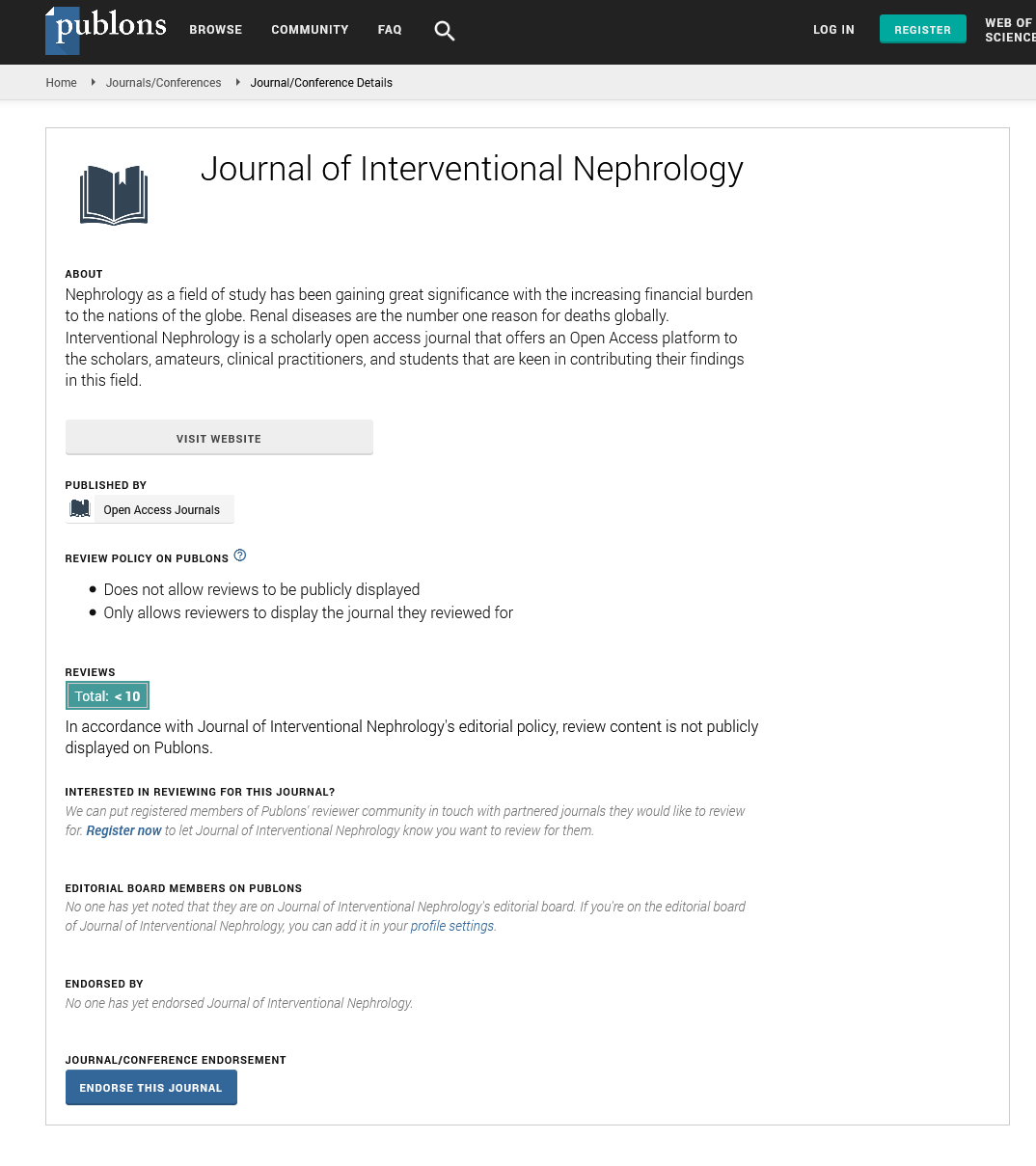Perspective - Journal of Interventional Nephrology (2024) Volume 7, Issue 4
Global Perspectives on Interventional Nephrology: Innovations, Challenges, and Collaborative Opportunities
- Corresponding Author:
- Mingli Yuan
Department of Nephrology, Drexel University, Egypt
E-mail: YuanMingli1700@es.edu
Received: 29-Jul-2024, Manuscript No. OAIN-24-143634; Editor assigned: 31-Jul-2024, PreQC No. OAIN-24-143634 (PQ); Reviewed: 13-Aug-2024, QC No. OAIN-24-143634; Revised: 20-Aug-2024, Manuscript No. OAIN-24-143634 (R); Published: 30-Aug-2024, DOI: 10.47532/oain.2024.7(4).298-299
Introduction
Interventional nephrology, a rapidly evolving subspecialty within nephrology, focuses on minimally invasive procedures for diagnosing and managing kidney-related conditions. This field has seen significant advancements globally, driven by innovations in technology, improved techniques, and a growing emphasis on patient-centered care. However, disparities in healthcare access, variations in practice standards, and the need for international collaboration pose challenges. This article explores the global perspectives on interventional nephrology, examining the innovations driving the field, the challenges faced across different regions, and the collaborative opportunities that can advance global nephrology care.
Description
Innovations in interventional nephrology
Technological advancements
• Minimally invasive techniques: Innovations
in minimally invasive techniques, such as
percutaneous renal biopsies, catheter-based
dialysis access creation, and endovenous laser
therapy, have revolutionized interventional
nephrology. These technologies reduce
procedural risks, recovery times, and improve
patient outcomes. Globally, advancements
in imaging modalities like ultrasound and
fluoroscopy have enhanced procedural
accuracy and safety.
• Biocompatible materials and devices: The development of new biocompatible
materials and devices, including drug-coated
balloons and advanced dialysis
catheters, has improved the longevity
and effectiveness of dialysis access. These
innovations address common complications
such as stenosis and infection, leading to
better patient outcomes.
Digital health and telemedicine
• Remote monitoring: Digital health solutions
and remote monitoring technologies are
becoming increasingly prevalent. Wearable
devices and telemedicine platforms enable
continuous monitoring of dialysis access
function and patient health, allowing
for early detection of issues and timely
interventions. This approach is particularly
valuable in regions with limited access to
specialized care.
• Artificial Intelligence (AI): AI and
machine learning are transforming
interventional nephrology by providing
predictive analytics and decision-support
tools. AI algorithms can analyze imaging
data, predict complications, and optimize
procedural planning, enhancing both the
precision and efficiency of interventional
procedures.
Challenges in global interventional nephrology
Healthcare access disparities
Resource limitations: In Low-and Middle-Income Countries (LMICs), limited access to advanced technologies and specialized care poses significant challenges. Inadequate infrastructure, lack of trained personnel, and financial constraints often result in suboptimal patient outcomes and increased mortality rates.
Variability in training and expertise: The availability of training programs and certification in interventional nephrology varies globally. Regions with limited training opportunities may struggle to develop a skilled workforce capable of performing complex interventional procedures.
Standardization and quality of care
Practice variations: There is considerable variability in interventional nephrology practices and standards across different countries and regions. This variation can impact the consistency and quality of care, making it difficult to establish uniform guidelines and protocols.
Regulatory challenges: Different countries have varying regulatory requirements for medical devices and procedures. Navigating these regulations can be complex, particularly for international collaborations and the adoption of new technologies.
Collaborative opportunities and solutions
Global research and knowledge sharing
International collaborations: Collaborative research initiatives and international conferences facilitate the exchange of knowledge, best practices, and innovations in interventional nephrology. By working together, experts from different regions can address common challenges, share successful strategies, and advance the field collectively.
Educational programs: Global partnerships can enhance educational opportunities for nephrologists worldwide. Training programs, workshops, and online courses can be developed to provide specialized education in interventional nephrology, addressing disparities in expertise and improving care quality.
Equitable access to technologies
Affordable solutions: Efforts to develop cost-effective and adaptable technologies can improve access to advanced interventional nephrology procedures in resource-limited settings. By focusing on affordability and local feasibility, innovations can be made accessible to a broader range of patients.
Supportive infrastructure: Strengthening healthcare infrastructure, including the availability of diagnostic tools, procedural equipment, and trained personnel, is crucial for improving interventional nephrology care in underserved regions. International organizations and governments can play a role in supporting these efforts.
Case studies: Global perspectives
United States and Europe
Advanced technologies: In the United States and Europe, the integration of cutting-edge technologies and research has led to significant advancements in interventional nephrology. Centers in these regions are often at the forefront of developing and adopting new procedures, contributing to improved patient outcomes and increased procedural safety.
Standardization efforts: Professional societies in these regions, such as the American Society of Diagnostic and Interventional Nephrology (ASDIN) and the European Society of Radiology (ESR), work to establish guidelines and standards for interventional nephrology, promoting consistency and high-quality care.
India and Africa
Innovative solutions: In India and parts of Africa, innovative approaches such as low-cost dialysis access solutions and community-based healthcare models are being explored to address resource limitations. Local initiatives and partnerships with international organizations aim to improve access to care and reduce disparities.
Training and capacity building: Training programs and workshops conducted by global health organizations and academic institutions are helping to build capacity and enhance skills in interventional nephrology across these regions.
Conclusion
Global perspectives on interventional nephrology reveal a dynamic field characterized by rapid technological advancements, diverse challenges, and significant opportunities for collaboration. Innovations in minimally invasive techniques, digital health, and biocompatible materials are driving improvements in patient care, while disparities in healthcare access and variability in practice standards highlight the need for collaborative solutions.
By fostering international research partnerships, improving access to technologies, and enhancing educational opportunities, the global nephrology community can address these challenges and advance the field of interventional nephrology. Embracing a collaborative and inclusive approach will ensure that patients worldwide benefit from cutting-edge advancements and high-quality care, ultimately contributing to better health outcomes and a more equitable healthcare landscape.
In summary, the global landscape of interventional nephrology is marked by both progress and disparity. Addressing these issues through innovation, collaboration, and equitable access will pave the way for a more effective and inclusive approach to kidney care worldwide.


